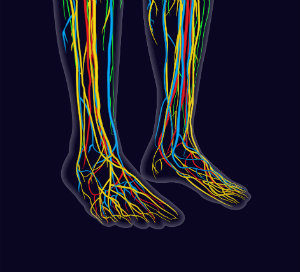


 We treat patients for many different conditions, but one of the most concerning is nerve damage in feet. Neuropathy is a condition wherein your peripheral nerves—the ones responsible for recording information and communicating it back to the spinal column and brain (your central nervous system)—are damaged. This can become an emergency situation when an untreated minor cut or sore breaks down over time and becomes an ulcer.
We treat patients for many different conditions, but one of the most concerning is nerve damage in feet. Neuropathy is a condition wherein your peripheral nerves—the ones responsible for recording information and communicating it back to the spinal column and brain (your central nervous system)—are damaged. This can become an emergency situation when an untreated minor cut or sore breaks down over time and becomes an ulcer.
Neuropathy is a concern no matter where in the body it develops, but nerve damage in the feet can be particularly alarming for a couple of reasons. First, your feet endure tremendous force loads on a daily basis, which puts them at heightened risk for injury and medical conditions. Second, feet are generally not particularly visible. Our lower limbs are often covered in socks and shoes, plus they are the furthest points on the body from our eyes. This means you have to be vigilant to catch those issues that can become medical emergencies if you have neuropathy!
Whereas neuropathy is commonly associated with diabetes—and rightfully so given that 60-70 percent of diabetic individuals will develop nerve damage during their lifetime—there are several other potential sources, including:
If you have sustained nerve damage in your feet that is causing problems like burning, tingling, or painful sensations, or you are unable to feel anything, come see us here at our Bloomington, IN office. We will determine the root cause of the problem and then create an effective treatment plan for you. If diabetes is responsible, we can help you develop a diabetic foot care plan to prevent issues from arising in the first place.
Call us at (812) 333-4422 for more information, or assistance in scheduling an appointment that works for you. You can also take advantage of our online form to contact us right now.